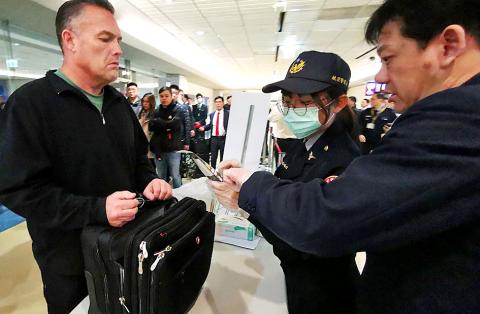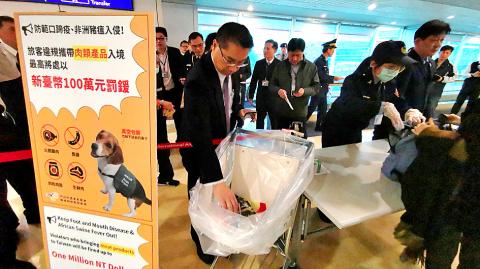Taiwan Taoyuan International Airport customs officers yesterday expanded inspections of carry-on luggage for passengers from China, Macau and Hong Kong — which are at high risk for African swine fever — but a lack of personnel and X-ray machines resulted in long lines of arriving passengers.
The Customs Administration began more thorough luggage inspections on a trial basis for travelers from areas affected by African swine fever to comply with an order given by Premier Su Tseng-chang (蘇貞昌) after he took office on Monday requiring all carry-on luggage from those areas to be manually checked.
The Aviation Police Bureau said it was instructed to assist in the quarantine efforts, adding that it would coordinate with other agencies in inspecting carry-on luggage at boarding gates.

Photo: Tony Yao, Taipei Times
With more than 100 flights daily from Hong Kong, Macau and China, the bureau said it has requested additional personnel from the National Police Agency.
Minister of the Interior Hsu Kuo-yung (徐國勇) yesterday visited the airport to oversee inspections and assisted inspectors by asking tourists to take any meat products out of their carry-on luggage and dispose of them in trash containers.
The inspections are in a trial phase, Hsu said, adding that the government would acquire X-ray machines as soon as possible to facilitate the inspections.

Photo: Tony Yao, Taipei Times
However, before that happens, inspectors would need to manually check the luggage, he added.
The first flight to undergo the trial inspections yesterday morning was an EVA Air (長榮航空) flight carrying 136 passengers from Hong Kong.
Inspectors found a package of sausages carried by a Russian visitor, which they disposed of.
Despite the lines, no arriving passengers were upset by the measure, Hsu said, adding that he found that the average wait time per passenger was about seven minutes.
A seven-minute wait is worthwhile if it keeps the nation from being devastated by African swine fever, he added.
Hsu tried to appease some police who complained that the Bureau of Animal and Plant Health Inspection and Quarantine had not sent enough personnel to help with the inspections, saying that the government would quickly acquire X-ray machines to lessen the workload.
Customs officers estimated that the airport would need 10 additional X-ray machines to inspect carry-on luggage from high-risk areas, costing NT$2 million to NT$2.5 million (US$64,870 to US$81,087) each.
Meanwhile, customs would need an additional 130 to 150 personnel to administer inspections in three shifts, they said, adding that it would also take time and funding to train the additional workforce.
The expanded inspections could trigger complaints from travelers, affecting the annual service quality review, they added.
The National Police Agency’s Border Affairs Corps said it could block the entry of tourists who have been fined by the Bureau of Animal and Plant Health Inspection and Quarantine for bringing contraband into the nation, even after they have passed through passport control.

‘ABUSE OF POWER’: Lee Chun-yi allegedly used a Control Yuan vehicle to transport his dog to a pet grooming salon and take his wife to restaurants, media reports said Control Yuan Secretary-General Lee Chun-yi (李俊俋) resigned on Sunday night, admitting that he had misused a government vehicle, as reported by the media. Control Yuan Vice President Lee Hung-chun (李鴻鈞) yesterday apologized to the public over the issue. The watchdog body would follow up on similar accusations made by the Chinese Nationalist Party (KMT) and would investigate the alleged misuse of government vehicles by three other Control Yuan members: Su Li-chiung (蘇麗瓊), Lin Yu-jung (林郁容) and Wang Jung-chang (王榮璋), Lee Hung-chun said. Lee Chun-yi in a statement apologized for using a Control Yuan vehicle to transport his dog to a

BEIJING’S ‘PAWN’: ‘We, as Chinese, should never forget our roots, history, culture,’ Want Want Holdings general manager Tsai Wang-ting said at a summit in China The Mainland Affairs Council (MAC) yesterday condemned Want Want China Times Media Group (旺旺中時媒體集團) for making comments at the Cross-Strait Chinese Culture Summit that it said have damaged Taiwan’s sovereignty, adding that it would investigate if the group had colluded with China in the matter and contravened cross-strait regulations. The council issued a statement after Want Want Holdings (旺旺集團有限公司) general manager Tsai Wang-ting (蔡旺庭), the third son of the group’s founder, Tsai Eng-meng (蔡衍明), said at the summit last week that the group originated in “Chinese Taiwan,” and has developed and prospered in “the motherland.” “We, as Chinese, should never

‘A SURVIVAL QUESTION’: US officials have been urging the opposition KMT and TPP not to block defense spending, especially the special defense budget, an official said The US plans to ramp up weapons sales to Taiwan to a level exceeding US President Donald Trump’s first term as part of an effort to deter China as it intensifies military pressure on the nation, two US officials said on condition of anonymity. If US arms sales do accelerate, it could ease worries about the extent of Trump’s commitment to Taiwan. It would also add new friction to the tense US-China relationship. The officials said they expect US approvals for weapons sales to Taiwan over the next four years to surpass those in Trump’s first term, with one of them saying

INDO-PACIFIC REGION: Royal Navy ships exercise the right of freedom of navigation, including in the Taiwan Strait and South China Sea, the UK’s Tony Radakin told a summit Freedom of navigation in the Indo-Pacific region is as important as it is in the English Channel, British Chief of the Defence Staff Admiral Tony Radakin said at a summit in Singapore on Saturday. The remark came as the British Royal Navy’s flagship aircraft carrier, the HMS Prince of Wales, is on an eight-month deployment to the Indo-Pacific region as head of an international carrier strike group. “Upholding the UN Convention on the Law of the Sea, and with it, the principles of the freedom of navigation, in this part of the world matters to us just as it matters in the